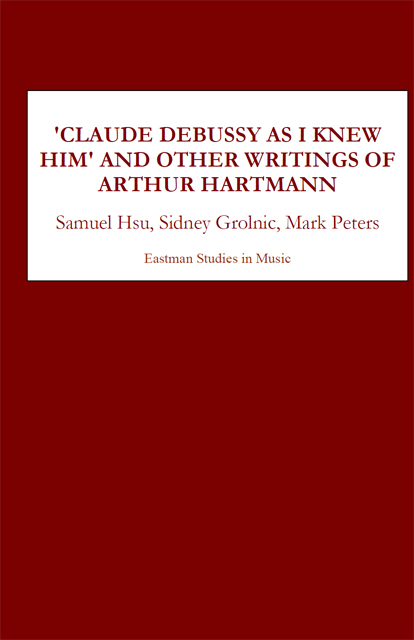Book contents
- Frontmatter
- Dedication
- Contents
- List of Photographs
- List of Facsimiles
- List of Music Examples
- List of Correspondence
- Foreword by David Grayson
- Preface
- Part 1 Arthur Hartmann
- Part 2 Claude Debussy
- Part 3 Other Writings of Arthur Hartmann
- Appendix A The Minstrels Manuscripts
- Appendix B Three Letters from Claude Debussy to Pierre Louÿs
- Arthur Hartmann: Catalogue of Compositions and Transcriptions
- Notes
- Archival Sources
- Bibliography
- Index
Foreword by David Grayson
Published online by Cambridge University Press: 17 March 2023
- Frontmatter
- Dedication
- Contents
- List of Photographs
- List of Facsimiles
- List of Music Examples
- List of Correspondence
- Foreword by David Grayson
- Preface
- Part 1 Arthur Hartmann
- Part 2 Claude Debussy
- Part 3 Other Writings of Arthur Hartmann
- Appendix A The Minstrels Manuscripts
- Appendix B Three Letters from Claude Debussy to Pierre Louÿs
- Arthur Hartmann: Catalogue of Compositions and Transcriptions
- Notes
- Archival Sources
- Bibliography
- Index
Summary
There is no escaping the subjective element in biography, and, in Debussy studies, nothing dramatizes this fact more than the controversy surrounding the 1932 publication of Léon Vallas's landmark biography Claude Debussy et son temps. The Revue musicale was the site of blistering exchanges between Henry Prunières, this journal's founder and director, and the book's author, with charges, rejoinders, and countercharges stretching across three issues and covering no fewer than thirty-two pages. In contention were numerous points of fact and interpretation, but Prunières's essential objection was that Vallas's portrait was inconsistent with his own image of the composer. Vallas, he charged, had not known Debussy personally and therefore misunderstood the composer's character and misconstrued his motivations. Indeed he compared Vallas to certain “stendhaliens” with whom he was acquainted, “who develop a sort of hatred toward the great man to whom they have devoted their lives.” To bolster his attack, Prunières enlisted support—and obtained considerable ammunition—from Robert Godet, a close friend of Debussy's during the last thirty years of the composer's life. Godet's contributions lent authority to Prunières's harsh critique, which, he declared, arose from a profound disappointment that their cherished image of Claude de France failed to shine through the great mass of documentation that Vallas had so laboriously assembled. Prunières further claimed the moral support of the composer's widow Emma Debussy, Charles Koechlin, Robert Jardillier, and “numerous admirers of Debussy.”
While I value Vallas's book, I can certainly sympathize with Debussy's family, friends, and fans. I had a similar reaction a number of years ago upon reading a weighty scholarly biography of one of my teachers, Nadia Boulanger. I learned a great deal from this book but was unable to recognize in it the teacher I knew and loved. Like Prunières, I had the sinking feeling that the author did not particularly like her subject, even though Mademoiselle Boulanger had extended numerous professional and personal courtesies, granting the author interviews and access to her papers, and even permitting photographs to be taken of the two of them together.
I had a completely different experience reading Bruno Montsaingeon's Mademoiselle: Conversations with Nadia Boulanger. This relatively slim book doesn't purport to be a biography, but it seemed to me to capture her essence—her profound wisdom and inimitable personality. She came alive for me on every page.
- Type
- Chapter
- Information
- Publisher: Boydell & BrewerPrint publication year: 2004

